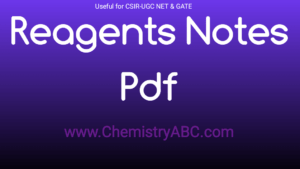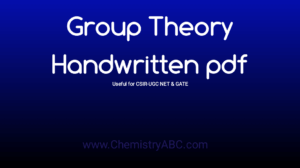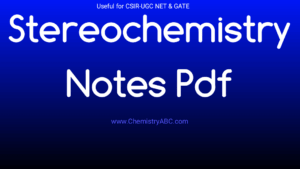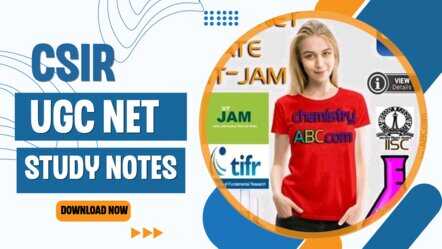Welcome to Your Ultimate Guide to CSIR NET Chemical Sciences!
Are you aspiring to crack the prestigious CSIR NET Chemical Sciences exam and take your career to new heights? This page is your one-stop destination for everything you need to excel in this competitive test. Whether you’re looking for the latest syllabus, expert preparation tips, downloadable study materials, or previous year question papers, we’ve got you covered. Designed specifically for passionate learners like you, this guide simplifies your preparation journey and ensures you stay ahead. Explore the resources, strategies, and insights tailored to help you achieve success in your CSIR NET Chemical Sciences endeavor!
The CSIR NET (Council of Scientific and Industrial Research National Eligibility Test) is a prominent examination for candidates aspiring to secure a lectureship or junior research fellowship in Chemical Sciences and other disciplines. Below is a structured breakdown of the information related to CSIR NET Chemical Science.
CSIR NET Syllabus 2024 for Chemical Sciences: Detailed Unit-Wise Guide
Preparing for the CSIR NET Chemical Science Exam 2024? A thorough understanding of the syllabus is crucial to ace this competitive exam. Here, we provide a detailed breakdown of the syllabus, including Physical, Organic, Inorganic, and Interdisciplinary Chemistry topics. Let’s explore the complete syllabus to help you plan your preparation effectively.
CSIR NET Syllabus 2024: Physical Chemistry
The Physical Chemistry section includes various chapters and topics fundamental to the subject. Below is a detailed list of topics:
Chapters and Topics
- Chemical Periodicity
- Homonuclear and heteronuclear molecules – Structure and Bonding
- Shapes of molecules (VSEPR Theory)
- Concepts of Acids and Bases
- The hard-soft acid-base concept
- Non-aqueous solvents
- Main Group Elements and Their Compounds
- Allotropy
- Synthesis
- Structure and bonding
- Industrial importance of compounds
- Transition Elements and Coordination Compounds
- Structure
- Bonding theories
- Spectral and magnetic properties
- Reaction mechanisms
- Inner Transition Elements
- Spectral and magnetic properties
- Redox chemistry
- Analytical applications
- Organometallic Compounds
- Synthesis, bonding, and structure
- Reactivity and homogeneous catalysis
- Cages and metal clusters
- Analytical Chemistry
- Separation methods
- Spectroscopic techniques
- Electro and thermoanalytical methods
- Bioinorganic Chemistry
- Photosystems, porphyrins, and metalloenzymes
- Oxygen transport and electron-transfer reactions
- Nitrogen fixation
- Metal complexes in medicine
- Characterization of Inorganic Compounds
- Techniques: IR, Raman, NMR, EPR, Mössbauer, UV-vis, NQR, MS, and microscopic methods
- Nuclear Chemistry
- Nuclear reactions, fission, and fusion
- Radio-analytical techniques and activation analysis
CSIR NET Syllabus 2024: Organic Chemistry
Organic Chemistry encompasses key principles and applications. The following topics are included:
Chapters and Topics
- Common Named Reactions and Rearrangements
- Applications in organic synthesis
- Principles of Stereochemistry
- Configurational and conformational isomerism
- Asymmetric induction, diastereoselectivity, and stereoselectivity
- Enantioselectivity
- Concepts in Organic Synthesis
- Disconnection, synthons, and protecting groups
- Linear and convergent synthesis
- Asymmetric synthesis
- Resolution methods: optical and kinetic
- Determination of Organic Compounds
- Techniques: IR, UV, and mass spectroscopy
- Pericyclic Reactions
- Cycloaddition, sigmatropic rearrangements, and electrocyclization
- Other concerted reactions
- Photochemical Reactions
- Principles and applications in organic chemistry
CSIR NET Syllabus 2024: Inorganic Chemistry
Inorganic Chemistry is vital for understanding the intricacies of chemical compounds. Here’s the breakdown:
Chapters and Topics
- Organometallic Compounds
- Bonding, structure, reactivity, and synthesis
- Applications in homogeneous catalysis
- Nuclear Chemistry
- Radio-analytical techniques
- Activation analysis, nuclear reactions, fission, and fusion
- Bioinorganic Chemistry
- Porphyrins, photosystems, oxygen transport, and nitrogen fixation
- Metal complexes in medicine
- Concepts of Acids and Bases
- Non-aqueous solvents and the hard-soft acid-base concept
- Chemical Periodicity
- Periodic table, elements, and groups
- Inner Transition Elements
- Redox chemistry, spectral and magnetic properties
- Analytical applications
CSIR NET Syllabus 2024: Interdisciplinary Chemistry
Interdisciplinary Chemistry focuses on the application of chemical principles across various fields. Key topics include:
Chapters and Topics
- Medicinal Chemistry
- Supramolecular Chemistry
- Environmental Chemistry
- Chemistry in Nanoscience and Technology
- Catalysis and Green Chemistry
CSIR NET Chemical Science Syllabus 2024: Weightage of Topics
Understanding the weightage of topics is essential for strategic preparation. Refer to the table below for an overview of sections, the number of questions, and marks distribution:
| Sections | Total Questions | Marks Per Section | Negative Marking | Marks Per Question | Total Time | Total Marks |
|---|---|---|---|---|---|---|
| Part A | 20 | 30 | 0.5 | 2 | 3 hours | 200 |
| Part B | 50 | 70 | 0.5 | 2 | ||
| Part C | 75 | 100 | 1.0 | 4 |
Plan Your CSIR NET 2024 Preparation with Us!
Stay ahead in your preparation with ChemistryABC.com. Access detailed study materials, mock tests, and expert tips to excel in the CSIR NET Chemical Science Exam.
Download the Complete CSIR NET Chemical Science Syllabus PDF Here
Need help with specific topics? Let us know in the comments!




















